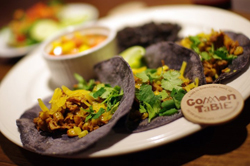The town of Bend, in central Oregon, is in what is often referred to as the least-churched county in the least-churched state. Even still, it is no stranger to church plants.
“Bend is like a graveyard for churches,” said one of its more recent pastors, the Rev. Zachary Hancock.
Hancock was called to be the organizing pastor for a proposed Presbyterian new church development in Bend.
“When I got to town all the young pastors looked at me as if ‘That’s just what we need here: another church planter,’” he said.
But Hancock wasn’t actually that interested in getting people to go to church.
“My big goal is not to get people to go to church, but to engage people in doing the living into the reality of God, which is the way of the gospels, the way of Christ,” Hancock said. “That doesn’t necessarily have to look like going to church and sitting in a pew and listening to a sermon.”
What it is about is ‘doing service’ in and for the world.
As with many churches, the steering committee of this NCD was interested in finding a way to reach out to young adults ages 18-35.
“I felt that we could really engage young people who don’t want anything to do with church if we could give them something to participate in and believe in that their heart knows as truth,” Hancock said.
This is different than simply trying to gather the young people and bring them into the church.
“What I was saying is that we need to pursue not an age group, but what we have been called to — what Christ has called us to. When we do that, people will follow, whatever their age is,” he said.
That call, in the case of Bend, has taken the form of the Common Table Public House. Its mission: “Feed all people, cherish the earth and pursue awareness.” Hospitality, welcome and action are at the heart of this ministry experiment that serves people daily, in the form of food and drink, and monthly with a shared meal and faith gathering.
“We are trying to be a place, to use the cliché, that earns the right to be heard — more than that, that earns the right to have the privilege of people joining you and trusting you that you are a safe place where they can be authentic, tell their story and participate.”
There are no crosses up at Common Table; as a public house, it has a full bar.
Common Table is trying to live up to its name — a common table that draws no distinction between people, regardless of who they are. One of the menu items, called the ‘World Bowl’ is offered by donations on a sliding scale. They’ve also created wooden tokens, with $10 carved onto them, which are distributed to those in need, who can then trade them in for a meal.
Hancock likens the space to the diversity often found in a subway station — a mix of the corporate executive with the briefcase standing alongside a schizophrenic talking to the wall. It is in this ‘great mix’ that Hancock sees the Kingdom of Heaven.
“A lot of our labor is through volunteers — and that is not just to save a buck,” said Hancock, who believes people practice a spiritual discipline when they volunteer. As a reminder, the dishwashing sink is surrounded by a painted mural of Brother Lawrence, the monk who is know for his ‘practice of the presence of God’ in all situations — including washing dishes.
Common Table sees food sourcing as another spiritual discipline.
“One of the other reasons that we opened a restaurant was because I felt like one of the ways we can make an impact on our planet is how we source our food — how far we bring it, how it is raised and how it is delivered,” Hancock said.
That’s a challenging goal in a world where we are accustomed to tomatoes year round. But Common Table is at least trying to point itself in that direction, with about 10 percent of its food being locally sourced, and a monthly ‘Meet Your Farmer’ dinner that tries to connect people more closely with the food they are eating.
Hancock recounts a story of some particularly mealy tomatoes: “They weren’t good because they were transported from really far away so I asked, ‘Why are we serving these if they are not good?’” They were being served because they were on the menu. “Then why don’t we change the menu?” he asked.
“We need to live out of our passion — I think people respond to that,” Hancock said. “I think that we don’t have enough imagination and we don’t trust that people are drawn to vibrancy.”
Erin Dunigan is a freelance writer, photographer, and pastor who lives in a small coastal community in Baja California, Mexico when she is not following her wanderlust out into the world.

